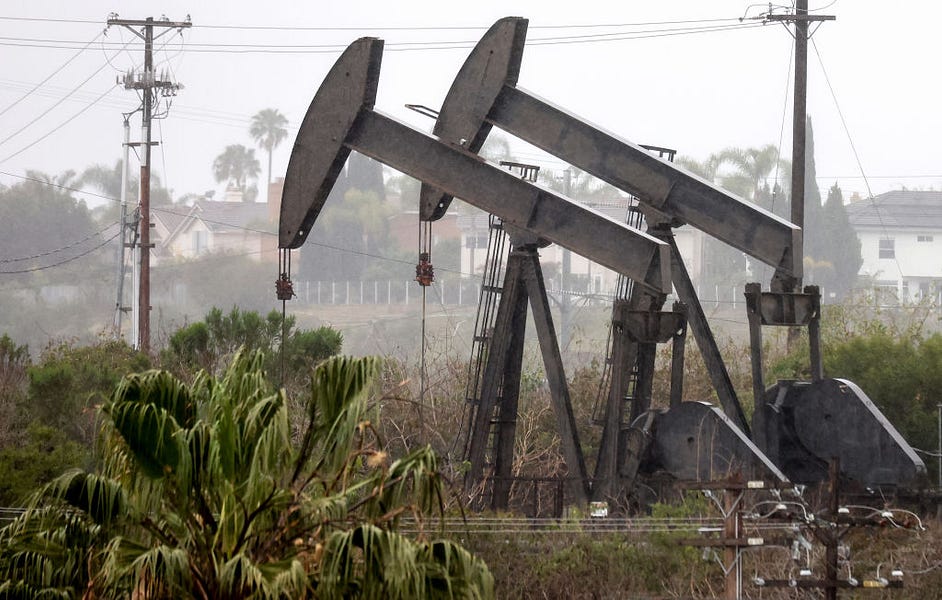The energy market, maybe you’ve noticed, is in a weird spot lately. Surging fuel and gas prices have led to political recriminations across Washington, with Republicans denouncing President Joe Biden’s climate-related antipathy to fossil fuel development and Biden laying the blame on energy-industry profiteering and Russia’s war of aggression in Ukraine.
But surging oil prices have also highlighted a rapid turnaround in the energy sector itself: After a decade in which hundreds of billions of dollars poured into renewables while fossil fuel behemoths like Exxon Mobil grew sluggishly, it’s suddenly the fossil fuel companies that are way in the black while green energy falters. The sudden shift in fortunes, in turn, is provoking new conversations about the future of so-called “environmental investing”—and adding fuel to Republican attempts to push back on it.
When energy demand cratered in the early days of the COVID pandemic, the oil industry faced a never-before-seen reckoning, which hit its nadir on April 20, 2020—the day the price of West Texas Intermediate crude briefly went negative. Shell-shocked companies tightened their belts, laying off employees and slashing future investment plans. Top-level industry executives speculated that the demand for oil might never recover, and signaled plans to invest more heavily in clean energy in the long term.
With fossil fuel companies in such a vulnerable state, environmental and activist investor groups smelled blood in the water. Organizations such the Sierra Club, which had for years tried to choke off Arctic oil and gas development by lobbying U.S. banks not to fund projects there, redoubled their efforts, which paid off: By the end of 2020, every major U.S. bank had pledged not to do so.
Such pledges were a prominent example of what’s commonly known as activist or ESG (for environmental, social, and governance) investing—the increasingly popular inclination of investors to make capital decisions based not only on likely financial return but also with an eye toward investing in companies perceived to be creating social good. The label is broad enough to cover a cornucopia of possible factors, but the most prominent ESG cause by far is fighting environmental despoliation and fossil-fuel-driven climate change.
The practice of “socially responsible investing” isn’t new, of course—as long ago as the 1960s, investors were carving tobacco companies or firms involved with South African apartheid out of their portfolios. But the current wave of ESG investment has taken shape around the notion that sustainable investing can be a both/and approach—that energy companies structured around sustainable revenue streams, for instance, would actually prove better financial investments in the long run as well.
“Managing a fund, you’ve got a lot of problems. You gotta meet your financial targets,” says Tom Sanzillo, director of financial analysis at the Institute for Energy Economics and Financial Analysis, an organization that advocates for a transition to a sustainable energy economy. “[Fossil fuel companies] used to be your biggest performers, and they’re not anymore. And it doesn’t look like the outlook is very good for the future. And so you say, forget it. And that’s what divestment is from a financial point of view.”
When it came to the energy sector, such arguments never looked stronger than they did in early 2020. But when the economy roared back faster than many anticipated, aided by a quicker-than-expected rollout of COVID vaccines, it brought with it an insatiable desire for oil that took even the companies themselves by surprise and sent their market value shooting skyward again.
And then, of course, came Russia’s attack on Ukraine—an event that sent energy prices spiking still higher as one of the world’s largest fuel exporters began severing economic ties with the rest of the world left and right, while its former partners in Europe and elsewhere found themselves in need of new suppliers. Suddenly, American fossil fuel producers were looking a lot more like an agent of social good after all. “We are on a war footing,” Energy Secretary Jennifer Granholm told oil and gas executives last month. “That means you producing more right now, where and if you can.”
Despite the recently juiced demand and high prices, the oil industry has been slow to leap back into new development after spending much of the pandemic moving the opposite direction. Instead, companies have used much of the windfall brought about by higher demand to placate surly investors with a shower of stock dividends.
This has had several interesting political consequences. For one, it has given progressives a villain to castigate in addition to Russian President Vladimir Putin, pointing darkly at high energy profits while consumers hurt at the pump.
On the other side of the aisle, it has brought about new recriminations from Republicans against ESG investing in general and financial institutions’ pledges not to fund energy development in particular. Texas last year passed a bill that, in the words of the state comptroller, “prohibits Texas state agencies that invest funds from investing in financial companies that boycott energy companies.” West Virginia passed a similar measure in January.
The divestment situation is different in Texas than it is in Alaska—no banks have pulled out of mainland energy development in the same way they have with Arctic drilling—but Texas Republicans have said they consider a company’s commitment to ESG investing as tantamount to an energy boycott. In January, Texas Lt. Gov. Dan Patrick publicly called for state Comptroller Glenn Hegar to put mutual fund manager BlackRock “at the top of the list” of companies Texas should divest from, accusing the company of “capriciously discriminating” against oil and gas by pressuring energy companies in which it invests to move away from fossil fuels and toward green energy. Under the direction of CEO Larry Fink, BlackRock has been at the forefront of the ESG investing boom, although it still invests hundreds of billions of dollars in fossil fuel companies around the world.
“BlackRock’s discrimination goes well beyond just its investment decisions,” Patrick wrote in his letter. “In a recent Wall Street Journal article, it was noted that ‘BlackRock made waves last spring when it voted to replace three Exxon Mobil Corp. directors over the oil giant’s reluctance to quickly transition to cleaner energy sources.’ It is not appropriate for Mr. Fink and BlackRock, or any other company, to arbitrarily strong-arm the energy sector to commit to exceed federal and state environmental laws.”
At the federal level, Alaska Sen. Dan Sullivan is mulling a measure that would reach farther, rewriting the financial playbook for investment fund managers at large. His forthcoming legislation would prohibit fund managers that oversee passive funds pegged to total market performance—the biggest by far of which are BlackRock, Vanguard, and State Street—from voting in shareholder elections of companies in which they invest without being instructed to do so by the investors whose funds they manage.
“It has distorted the market, as you guys know, tremendously to have these three companies with massive, massive power,” Sullivan said on CNBC in March. “And I think that it reflects on the energy policies that we’re talking about that are not supported by the average American.”
It’s unclear to what extent investor boycotts are playing a role in the current level of fossil fuel development. It may simply be the case that companies’ own priorities and the priorities of politicians in the states in which they operate don’t completely overlap: Energy firms that were burned by being overextended during the pandemic are retrenching and expanding development again gingerly, while politicians are less concerned with the companies’ risk than with the boosts to employment and the economy that expansion portends.
That said, some industry advocates tell The Dispatch that such boycotts have made raising capital for new projects more challenging, particularly for smaller firms that can’t self-finance development.
“Some big companies like Exxon-Mobil, they have strong balance sheets that they don’t go seek project financing. But there are other companies in Alaska that absolutely do,” Kara Moriarty, president and CEO of the Alaska Oil and Gas Association, told The Dispatch. “And I have heard some of my members say that this new wave of financial institutions saying they’re no longer going to project finance in Alaska has made it harder to attract investment here.”






Please note that we at The Dispatch hold ourselves, our work, and our commenters to a higher standard than other places on the internet. We welcome comments that foster genuine debate or discussion—including comments critical of us or our work—but responses that include ad hominem attacks on fellow Dispatch members or are intended to stoke fear and anger may be moderated.
With your membership, you only have the ability to comment on The Morning Dispatch articles. Consider upgrading to join the conversation everywhere.